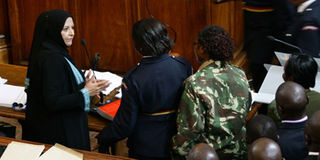Much good-natured banter in court

PHOTO | BILLY MUTAI Security personnel approach Ms Naslin Umar (left) as she raised an issue with the election petition at the Supreme Court on March 25, 2013.
What you need to know:
- It’s rare humour in the corridors of justice as Muigai takes a gentle dig at retired Attorney General Wako
The real moment of drama at Monday’s pre-trial conference at the Supreme Court in Nairobi arrived about an hour-and-a-half into the proceedings.
Its source was one-time presidential candidate Nazlin Rajput Umar.
She had somehow managed to get into the room and sat somewhere in the back before she saw the opportune moment and surged to the front bench, reserved for the lead lawyers, waving a red volume.
She was loud and unstoppable, but the thrust of her argument was that Chief Justice Willy Mutunga is biased in favour of Prime Minister Raila Odinga and should not be on the bench.
As she rose, the target of her attacks leaned back in the seat, leaving it to his colleagues, who had said nothing since the conference started, to rebut.
Force her to sit down
Clad in a black buibui and waving her application, she continued talking as Justices Mohammed Ibrahim and Jackton Ojwang urged her to sit down.
When the police women approached to remove her, she pointed at them and told the judges she would not be intimidated.
It was finally left to Justice Smokin Wanjala to force her to sit down.
“You have to go by the authority of this court. If you expect justice, justice cuts both ways. You don’t come to court by your own justice. This court is ready to listen to all Kenyans as long as they are properly before the court. This is not a political rally. It is the court of law. You have to abide by the orders that flow from this bench.”
When she attempted a final surge, he held firm.
“This court is not going to be held at ransom. You defy that order at your own peril.”
Before she interrupted proceedings, the first bite of the cake had been given to a senior member of the Kenyan Bar, Attorney General Prof Githu Muigai.
Prof Muigai introduced two words that trended for some time on social media — amicus curiae, Latin for “a friend of the court”.
He was granted his request in the afternoon.
Prof Muigai likes to speak with much gravity and not many could suppress their laughter when he took a gentle dig at retired Attorney General Amos Wako, who is now a Senator-elect and part of the Cord legal team.
“In the past, the Attorney General would be required in court, but he never appeared,” he said.
Kenya has began another week of waiting to know what direction the presidential contest could take.
This will be the second suspenseful week of March. The first started on March 4 and ended on the afternoon of Saturday March 9 at the Bomas of Kenya.
From the decision by the Independent Electoral and Boundaries Commission sprang the proceedings at the highest court in the land.
All eyes will be focused on a wood-panelled chamber at the Supreme Court Building in Nairobi. Before the High Court moved to Milimani, that room was one of the places the court was convened.
It is the same room in which Justice Muga Apondi ruled in May 2009 that Tom Cholmonedley would spend seven months in jail for the killing of Robert Njoya, a stonemason from Naivasha.
A lot has changed since 2009 though. The judges don’t have to write down every word, there are secretaries typing away, everybody speaks into a microphone, every word spoken there is recorded and there is a digital stopwatch in addition to the analogue clock on the wall.
In the afternoon, Justice Mutunga advised lawyer Kethi Kilonzo that she need not burden herself with the black gown members of her profession like to wear.
The Supreme Court Building is old — the foundation stone was laid in 1930 — and the institution it hosts has been under constant renewal since August 2010, but the first hurdle was a physical one.
The heat was stifling
It was clear that the high-powered assembly of lawyers plus the journalists and activists who had converged to witness and report on the historical petition could not all fit in the room.
Judiciary Registrar Gladys Boss Shollei had to shoo out as many people as she could, saying, as she indicated the gallery: “If you’re not participating, there is more space up there.”
She said the judges would not like to have anybody standing in court. Only the lawyers participating could fit in the seven benches in the court.
Even with every window opened as wide as possible, the heat was still stifling.
A good part of the afternoon and early evening was spent arguing about a voluminous 900-page document with an orange cover and a black spine that was an affidavit filed by Cord.
The lawyers passed it amongst them. The judges will decide on Tuesday whether it will be admitted.
This morning, the lawyers are supposed to agree with the judges on how the 15 hours over the next two days will be split between them.
With the events live on television, we have another dramatic week on our hands.




